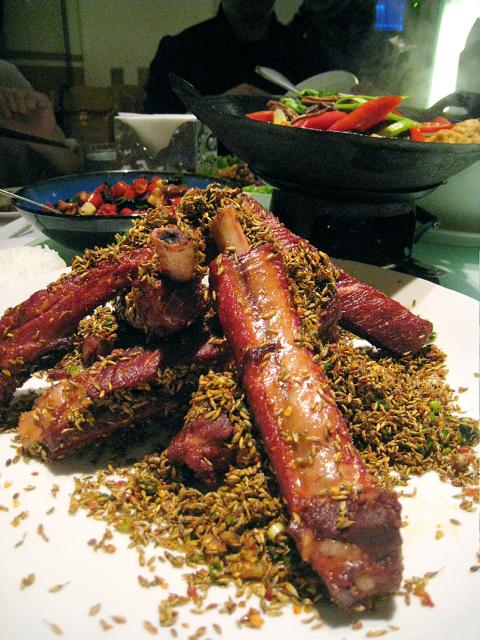1010 Hunan Cuisine (1010湘辣料理), an undertaking by the Tai Tong Food & Beverage Group (瓦城泰統集團), which already has two successful chain restaurants — Thai Town (瓦城) and Very Thai (非常泰) — under its belt, shares many similarities with its Thai-inspired counterparts. Located on the sixth floor of the Eslite Bookstore Xinyi Branch (信義誠品書店), it boasts a clean-cut interior, a family-friendly atmosphere and a menu that alters traditional recipes to cater to the popular palate.
I was unable to book a table one day before a planned meal on a recent Sunday evening. Sensing my disappointment over the phone, the staff person suggested that my group come before 6pm to avoid a long wait. One hour after arriving, our six-person party was seated in a brightly lit dining area featuring a soothing color scheme of light wood brown and pastel white.
The menu begins with the restaurant’s top 10 dishes, which could be seen on many of the dining tables. The fried pork ribs with chili and fennel spices (神仙孜然肋排骨, NT$130 per rib) was a mouthwatering highlight. First marinated with dozens of spices and then deep-fried to a crisp golden brown with different types of chili, the ribs burst with meaty juiciness, while a thin, fried layer of cumin added a delightful crunchiness.

Photo: Ho Yi, Taipei Times
The restaurant’s rendition of hot pot of preserved tofu and pork intestine (臭豆腐肥腸干鍋, NT$380) is a standard mixture of chunks of congealed pig blood, intestines and tofu that absorb the savory broth, which is flavored with lashings of chili and chopped scallion. However, when the fried chicken meat, heart and gizzards Hunan style (鄉巴佬炒雞, NT$280) and fried chicken with red chili (辣子尋雞丁, NT$280) arrived, the heaps of chilies started to lose their novelty value, and a few of my dining companions complained that the chili was too mild and had been toned down to suit popular tastes.
Among the disappointments on our table was the fish ball and spinach soup (菠菜魚丸湯, NT$250 or NT$320), which was as insipid as it sounds.
Another highlight of the meal, buns with condensed milk (金銀饅頭, NT$120 for six buns), available steamed or deep-fried, offered a brief escape from the bombardment of flavors.
The restaurant has a small vegetarian menu that includes sauteed shredded potato with vinegar (醋溜土豆絲, NT$180), which has a pleasant tartness and makes a good appetizer.
For a group of three to six, a selection from the set menu, which features many of the restaurant’s signature dishes, costs NT$450 per person plus a 10 percent service charge.
1010 Hunan Cuisine operates two other venues in Taipei and two in Taichung. For more information, visit the restaurant’s Web site at www.1010restaurant.com.

April 14 to April 20 In March 1947, Sising Katadrepan urged the government to drop the “high mountain people” (高山族) designation for Indigenous Taiwanese and refer to them as “Taiwan people” (台灣族). He considered the term derogatory, arguing that it made them sound like animals. The Taiwan Provincial Government agreed to stop using the term, stating that Indigenous Taiwanese suffered all sorts of discrimination and oppression under the Japanese and were forced to live in the mountains as outsiders to society. Now, under the new regime, they would be seen as equals, thus they should be henceforth

Last week, the the National Immigration Agency (NIA) told the legislature that more than 10,000 naturalized Taiwanese citizens from the People’s Republic of China (PRC) risked having their citizenship revoked if they failed to provide proof that they had renounced their Chinese household registration within the next three months. Renunciation is required under the Act Governing Relations Between the People of the Taiwan Area and the Mainland Area (臺灣地區與大陸地區人民關係條例), as amended in 2004, though it was only a legal requirement after 2000. Prior to that, it had been only an administrative requirement since the Nationality Act (國籍法) was established in

With over 80 works on display, this is Louise Bourgeois’ first solo show in Taiwan. Visitors are invited to traverse her world of love and hate, vengeance and acceptance, trauma and reconciliation. Dominating the entrance, the nine-foot-tall Crouching Spider (2003) greets visitors. The creature looms behind the glass facade, symbolic protector and gatekeeper to the intimate journey ahead. Bourgeois, best known for her giant spider sculptures, is one of the most influential artist of the twentieth century. Blending vulnerability and defiance through themes of sexuality, trauma and identity, her work reshaped the landscape of contemporary art with fearless honesty. “People are influenced by

Three big changes have transformed the landscape of Taiwan’s local patronage factions: Increasing Democratic Progressive Party (DPP) involvement, rising new factions and the Chinese Nationalist Party’s (KMT) significantly weakened control. GREEN FACTIONS It is said that “south of the Zhuoshui River (濁水溪), there is no blue-green divide,” meaning that from Yunlin County south there is no difference between KMT and DPP politicians. This is not always true, but there is more than a grain of truth to it. Traditionally, DPP factions are viewed as national entities, with their primary function to secure plum positions in the party and government. This is not unusual